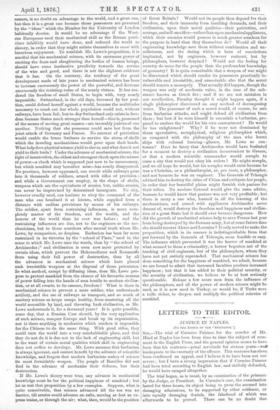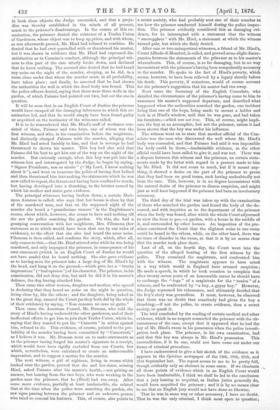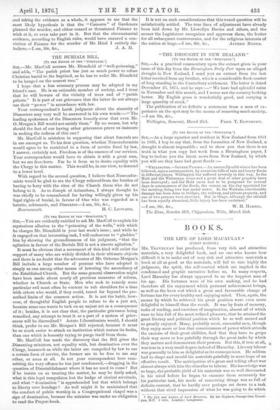LETTERS TO THE EDITOR.
JUSTICE MT NAPLES.
[TO THE EDITOR OF THE "SPECTATOR.") Sin,—The trial of Carmine Paisano for the murder of Mr. Hind at Naples has been from time to time the subject of com- ment in the English Press, and the general opinion seems to have been that his sentence—penal servitude for sixteen years—was inadequate to the enormity of the offence. This sentence has since been confirmed on appeal, and I believe it to have been not too severe ; but I have a strong impression that if Carmine Paisano had been tried according to English law, and skilfully defended, he would have escaped altogether.
The trial began, as is usual, by an examination of the prisoner by the Judge, or President. In Carmine's case, the examination lasted for three hours, its object being to press the accused into damaging admissions, to be supported by other evidence, or into equally damaging denials, the falsehood of which was afterwards to be proved. There can be no doubt that
in both these objects the Judge succeeded, and that a preju- dice was thereby established in the minds of all present, much to the prisoner's disadvantage. In the course of this ex- amination, the prisoner denied the existence of a Trades Union of Gardeners, whose object was to keep up prices, and with whom, as was afterwards proved, Mr. Hind bad refused to combine. Be denied that he had ever quarrelled with or threatened his master, but it was shown in evidence that Mr. Hind had expressed dis- satisfaction as to Carmine's conduct, although the principal wit- ness to this part of the case utterly broke down, and declared that he knew nothing. The accused also denied that he had heard any noise on the night of the murder, sleeping, as he did, in a room close under that where the murder must, in all probability, have taken place ; and finally, he asserted that he had shown the authorities the well in which the dead body was found. This the police officers denied, saying that there were three wells in the garden, of which Paisano had pointed out two, but not the one in question.
It will be seen that in an English Court of Justice the prisoner would have escaped all the damaging inferences to which this ex- amination led, and that he would simply have been found guilty or acquitted on the testimony of the witnesses called.
It is to be remembered that Mr. Hind's staff of workmen con- sisted of three, Paisano and two boys, one of whom was the first witness, and who, in his examination before the magistrate, had distinctly charged Paisano with the murder, alleging that Mr. Hind had acted harshly to him, and that in revenge he had threatened to drown his master. This boy had also said that Paisano did his beat to get him out of the way on the night of the murder. But curiously enough, when this boy was put into the witness-box and interrogated by the Judge, he began by saying, "Signor Presidente, non so niente" (" My Lord, I know nothing about it"), and went on to accuse the police of having first bribed and then threatened him into making the statements which he was now called to repeat, the threats not having been confined to words, but having developed into a thrashing, to the bruises caused by which his mother and sister gave evidence.
The principal witnesses having broken down, a certain Mari- anna Azzarese is called, who says that her house is close by that of the murdered man, and that on the supposed night of the murder she heard a "grandissimo rumore " in the Englishman's rooms, about which, however, she seems to have said nothing till she saw the police searching the garden. On this, she had a gossiping conversation with her neighbour, Mrs. Filomena (her statement as to which would have been shut out by our rules of evidence), to the effect that she also had heard the same noise. Filomena is then called, and confirms the story, which, after all, only comes to this,—that Mr. Hind uttered cries while he was being murdered, and only impugned the prisoner, in consequence of his own statement (which in an English Court of Justice he would not have made) that he heard nothing. She also gave evidence as to having seen the prisoner take a large dog of Mr. Hind's by the head, and bang it on the ground,—which gave her a " brutta impressions" ("bad opinion") of his character. The prisoner, in his examination, did not deny this, but said he did it in his master's defence, the dog having attacked him.
Then came two other women, daughter and mother, who agreed in declaring that they heard no noise on the night in question, living close by, like the others ; and the daughter, being asked as to the great dog, amazed the Court (as they both did by the whole of their evidence) by saying, "Non conosco ne cane ne gatto."
Then came the American Consul, Mr. Duncan, who told the story of Hind's having undersold the other gardeners, and of their ineffectual efforts to get him to join their Trades Union, which he, saying that they wanted to put the " Camorra " in action against him, refused to do. This evidence, of course, pointed to the pro- bability of the murder having been committed by " Camorristi," as I believe it vas. Mr. Duncan went on to make statements as to the prisoner having forged his master's signature to a receipt, which would have been rigidly excluded from our Courts, but which, nevertheless, were calculated to create an unfavourable impression, and to suggest a motive for the murder.
The next witness, a girl of eighteen, living in rooms which looked over the garden, proved that she and her sister, missing Hind, asked Paisano after his master's health,—not getting an answer, but hearing from the two boys, who were working in the garden near the prisoner, that he (Hind) had run away. After some more evidence, partially at least inadmissible, she related that at the time when the police were searching the garden, she saw signs passing between the prisoner and an unknown person who tried to conceal his features. This, of course, also points to a secret society, who had probably sent one of their number to see how the prisoner conducted himself during the police inspec- tion. The prisoner evidently considered this as damaging evi- dence, for he interrupted with a statement that the witness " amoreggiava " with Mr. Hind, a statement at which the witness turned pale, but which she flatly denied.
After one or two unimportant witnesses, a friend of Mr. Hind's, CountAlfredo di Momfort, is called, and proved some slight discre- pancies between the statements of the prisoner as to his master's whereabouts. This, of course, is so far damaging, but in no way inconsistent with the prisoner's having been compulsorily accessory to the-murder. He spoke to the fact of Hind's poverty, which seems, however, to have been relieved by a legacy shortly before his death. This poverty, if notorious, would of course account for the prisoner's suggestion that his master had run away.
Next came the Secretary of the English Consulate, who detailed the circumstance of the prisoner's having come to him to announce his master's supposed departure, and described what happened when the authorities searched the garden, one incident being that one of the boys, being made to mount a ladder and look in at Hind's window, said that he was gone, and had taken his furniture,—which was not true. This, of course, might impli- cate the boy as an accomplice, but not the prisoner, unless it had been shown that the boy was under his influence.
The witness went on to state that another official of the Con- sulate was the man who discovered the well where Mr. Hind's body was concealed, and that Paisano had said it was impossible the body could be there,—inadmissible evidence, as the other official could have been called to give it, and was not. There was a dispute between this witness and the prisoner, on certain state- ments made by the latter with regard to a present made to him by Mr. Hind. It did not come to much, but if it meant any- thing, it showed a desire on the part of the prisoner to prove that they had been on good terms, such having undoubtedly not been the case. This, however, is in no degree inconsistent with the natural desire of the prisoner to disarm suspicion, and might just as well have happened if the prisoner had been an involuntary accessory.
The third day of the trial was taken up with the examination of those who searched the garden and found the body of the de- ceased, and with inquiries as to the deportment of the prisoner when the body was found, after which the whole Court adjourned to view the locus in quo,—a garden, with a house in the middle of it, and surrounded by other houses. An inspection of the pre- mises convinced the Court that the slightest noise in one room could be heard in the others, while, on the other hand, there was no trace of disorder in the room, so that it is by no means clear that the murder took place there.
Last of all, on the fourth day, the Court went into the question of the alleged beating of the first witness by the police. They examined the magistrate, and confronted him with the witness. The magistrate appears to have acted in a way which would in England have aroused suspicion ; He made a speech, in which he took occasion to complain that after twenty-seven years of an honourable career he should have to exchange the " toga " of a magistrate for the " tunica" of a witness, and be confronted by "a boy, a gypsy boy." However, the Judge repressed his vehemence, and ultimately decided that the boy's story was groundless. It must, however, be observed that there was no doubt that somebody had given the boy a thrashing,—if not the police, to create evidence, then a secret society, to quash it.
The trial concluded by the reading of certain medical and other evidence, which in no respect connected the prisoner with the cir- cumstances of the case, except that it appeared that he had the key of Mr. Hind's room in his possession when the police investi- gation took place. The prisoner, in his own examination, had said that this key was always in Mr. Hind's possession. This contradiction, if it be one, could not have come out under our forms of criminal procedure.
I have endeavoured to give a fair sketch of the evidence as it appears in the Opinione newspaper of the 18th, 19th, 20th, and 21st September last. The report seems to me to be pretty full, though evidently only an abstract in some cases. If we eliminate all those points of evidence which in an English Court would have been inadmissible, I think we shall be led to the conclusion that a jury leaning to acquittal, as Italian juries generally do, would have acquitted the prisoner ; and it is by no means clear to me that an English jury would not have done so likewise.
That he was in some way or other accessory, I have no doubt. That he was the only criminal, I think most open to question;
and taking the evidence as a whole, it appears to me that the most likely hypothesis is that the " Camorra " of Gardeners planned the murder, and either coaxed or threatened Paisano to wink at it, or even take part in it. But that the circumstantial evidence, according to English rules, would have ensured a con- oriction of Paisano for the murder of Mr. Hind I entirely dis-




































 Previous page
Previous page